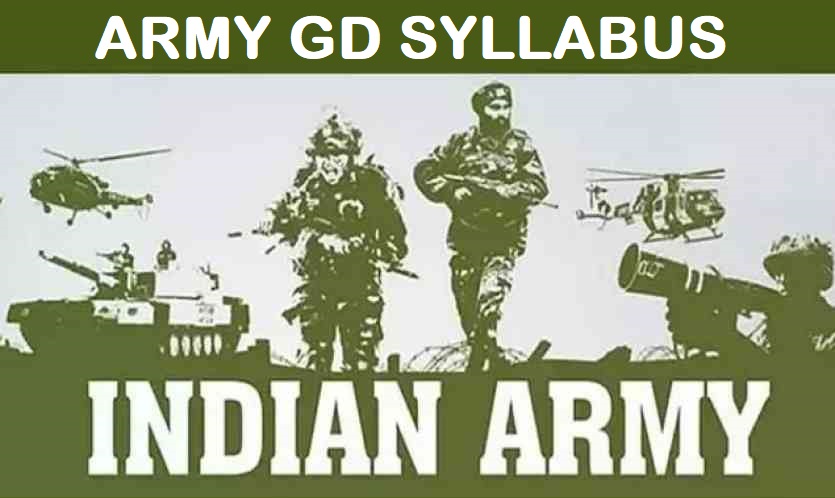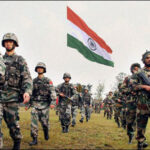Army GD Syllabus 2020. Army GD Bharti 2020. Welcome to FlizzIndia Here we have the Latest Syllabus of Army GD. Army GD Stands for “Army General Duty”.
Aspirants looking for the best Army GD Coaching in India : Click Here

Army GD Syllabus
Indian Army Syllabus 2020 for GD, Havildar, Relegious Teachers, Tradesmen, Soldier Technical, GD, Clerk and Storekeeper posts. The exam syllabus will have topics of following subjects. Candidates have to secure minimum prescribed marks to Join Indian Army
Army GD Exam Pattern
| S.NO | SUBJECT | QUE | MARKS | PASS MARKS |
| 1. | General Knowledge | 15 | 30 | 32 |
| 2. | General Science | 20 | 40 | |
| 3. | Maths | 15 | 30 | |
| TOTAL | 50 | 100 | Time-60 min |
Note- NCC ‘C’ Certificate Holders Are Exempted
TOPIC COVERD
| PAPER –I General Knowledge | PAPER –II Mathematics | PAPER – III Science |
| Awards & Prizes | Menstruation | Biology |
| Terminology | Geometry | Physics |
| Abbreviations | Arithmetic | Chemistry |
| History | Algebra | Scientific terms |
| Geography | ||
| Sports |
NEGATIVE MARKS – 2 Mark Will Be Awarded For Every Correct Answer, While ½ Marks Will Be Deducted For A Wrong Answer.
EXAMINATION DETAILS
| EXAM- ARMY (GD/Clerk/Nursing) | Forms- This examination is generally held four times in a yearAge Limit – 17.5 – 21 years |
| EDUCATIONAL QUALIFICATION | SSLC/ Matric with 45% marks in aggregate, scoring 32% in each subject. If you have higher qualification (10+2 or above), then the percentage of your marks is not a criteria. |
| MODE OF SELECTION | Physical MeasurementPhysical Ability TestMedical ExaminationWritten Test |
Detailed Syllabus
1.General Knowledge
This test includes questions relating to India and its neighboring countries. Questions are set especially to test knowledge about History, Culture, Geography and who’s who. Also the questions related to popular Indian Armed Forces, Abbreviations, Games, Awards, Terminology, Books and Authors, Continents and Sub Continents, Inventions and Discoveries, Indian Constitution are set. Questions may also be asked about International Organizations, Knowledge of Important events in the recent years, Current affairs of world events etc.
2. English
Parts of Speech; Comprehension; Sentences; Tenses; Idioms and Phrases; One word substitution; Synonyms and antonyms etc.
3. Mathematics
Fundamental arithmetical operations; Probability and Statistics; Analytical Geometry; Integral Calculus; Matrices & Determinants; Differential Calculus; Mensuration; Algebra; Number System; Area, Volume and Surface Area etc.
4. Geography
Agriculture, Geomorphology, Human Geography, Climatology, Cultural Settlements, Oceanography, Biogeography, Environmental and economic Geography, Population, Regional Planning Models, Geography of India and Resources, Industry Transport, Communication and Trade, Contemporary Issues etc.
5. History
Indian History from Ancient to Modern, Industrial Revolutions, India’s Freedom Struggle, Post Independence issues, World History including World War–I and World War–II, Economic depression, Communism, capitalism and socialism etc.
6. General Science
Basic questions related to Physics, Chemistry and Biology. Paper will have questions based on fundamentals and day to day activities (like, difference between the living and non-living beings, basics of life & cells, protoplasms and tissues, basic of plants and animals, basic knowledge of human body, common epidemics, their causes and prevention etc.
7. Physics
Type and properties of magnet, Simple Electrical Circuits, Force and Momentum, Sound waves, Physical Properties and States of Matter, Volume, Density and Gravity, Principle of Archimedes, Barometer, Motion, Velocity and Acceleration, Newtons Laws, Parallelogram of Forces, Stability and Equilibrium of bodies, Gravitation, Power and Energy, Heat, Reflection and refraction, Mirrors, Lenses, Electricity, Conductors, Ohms Law, Heating, Mass, Weight etc.
8. Chemistry
Carbon and its forms, Formulae and simple Chemical Equations, Physical and Chemical changes, Symbols, Elements, Mixtures and Compounds, Properties of Air and Water, Chemical Combination, Preparation and Properties of Important Gases, Oxidation and Reduction, Acids, bases and salts, Natural and Artificial Fertilizers, Structure of Atom, Atomic, Valency.
9. Biology
Basics of Biology, Uniqueness of human body, Study of Birds, Life Process, Human Beings, Food and Health, Food Yield, Balanced diet, Wasteful Food Practices, Cycles of materials, Habitat and Organisms, Ecological balance, Living resources, Adaptation.
10. Computer
Basic of computer and Operating System; Concept of Memory; Input & Output Devices; Introduction to Windows, MS Word, MS Excel, MS Power Point etc






